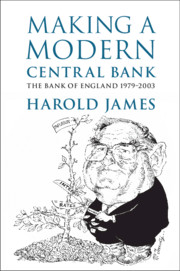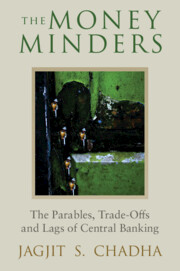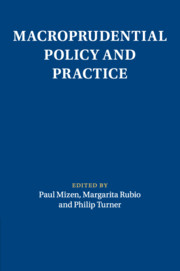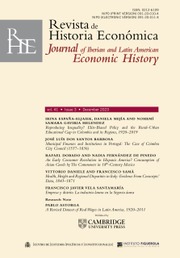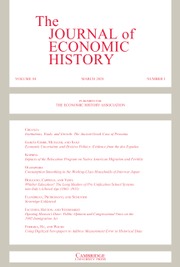Making a Modern Central Bank
The Bank of England 1979–2003
$43.99 USD
Part of Studies in Macroeconomic History
- Author: Harold James, Princeton University, New Jersey
- Date Published: September 2020
- availability: This ISBN is for an eBook version which is distributed on our behalf by a third party.
- format: Adobe eBook Reader
- isbn: 9781108890694
Find out more about Cambridge eBooks
$
43.99 USD
Adobe eBook Reader
Other available formats:
Hardback, Paperback
Looking for an inspection copy?
This title is not currently available on inspection
-
Making a Modern Central Bank examines a revolution in monetary and economic policy. This authoritative guide explores how the Bank of England shifted its traditional mechanisms to accommodate a newly internationalized financial and economic system. The Bank's transformation into a modern inflation-targeting independent central bank allowed it to focus on a precisely defined task of monetary management, ensuring price stability. The reframing of the task of central banks, however, left them increasingly vulnerable to financial crisis. James vividly outlines and discusses significant historical developments in UK monetary policy, and his knowledge of modern European history adds rich context to archival research on the Bank of England's internal documents. A worthy continuation of the previous official histories of the Bank of England, this book also reckons with contemporary issues, shedding light on the origins of growing backlash against globalization and the European Union.
Read more- Explores the political consequences of the Bank of England's move to central bank independence
- Offers insight into how backlash against globalization and the European Union emerged
- Examines both European and international context
Reviews & endorsements
'In 1979, as Harold James remarks, 'there was no way of really knowing what the Bank of England was supposed to do'. But by 2003, the Bank seemed remade as a Modern Central Bank, with one core objective – to hit the inflation target defined by statute. In this insightful and lucidly written book, James explains the complex interplay of economic, financial and intellectual developments which led from the confused opacity of the 1970s to the apparent clarity of the early 2000s. And in a brilliant epilogue, he explores how confidence in the new philosophy melted in the face of the 2007-08 financial crisis. Anyone seeking to understand the still unresolved challenge of delivering monetary and financial stability in a modern economy should read this book.' Lord Adair Turner, former Chair of UK Financial Services Authority
See more reviews'In this authoritative and judicious account, a distinguished historian explains how profoundly the Bank of England was changed and updated between 1979 and the early 2000s. The transformation he describes, towards a transparent, professional and independent central bank, was indeed essential. But, as the financial crisis and now the rise of digital money make clear, that was not the end of history. Central banks have to adapt to constant changes in the demands upon them and the world around them. The Bank of England is and always will be a work in progress.' Martin Wolf, Financial Times
'Harold James's book tells the tale of the transformation of the Bank of England from its historical image as the most stately of central banks to its present reality as one of the most modern, efficient and impressive of the leading central banks. This book describes in interesting detail the reforms following the Bank's independence.' Stanley Fischer, BlackRock
'It is not an easy book, but the author handsomely rewards everyone who has read it. Of course, even minimal knowledge of Britain's modern economic history makes reading easier. But the book is not only intended for lovers of economic history. Anyone interested in economics (even students) will benefit a lot from it, because the author has a great deal of economic knowledge. The book thus helps to consolidate theoretical knowledge. And all this is due to the detailed description of transplanting many economic trends into the British soil.' Pawel Kowalewski, Obserwator Finansowy
'James has written a fascinating history of the Bank of England during a tumultuous period of policy-making … benefits from access to internal memos and reports, as well as interviews with many of the key players … ranges over the BOE's involvement in financial supervision as well as its role in promoting the City of London.' Harold James, America Social Sciences
'Scholars of economic policy in late-twentieth century Britain, and of the comparative history of central banks, must engage with this book.' John Singleton, EH.Net
Customer reviews
Not yet reviewed
Be the first to review
Review was not posted due to profanity
×Product details
- Date Published: September 2020
- format: Adobe eBook Reader
- isbn: 9781108890694
- availability: This ISBN is for an eBook version which is distributed on our behalf by a third party.
Table of Contents
1. Introductory
2. Foreign Fetters
3. The Performance of the UK Economy
4. The Inexplicable in Pursuit of the Uncontrollable: Monetary Strategy
5. “A Good Deal of Bad Advice”: The Battle over Policy Control
6. The Long Shadow of the Deutschemark: The Exchange Rate Alternative
7. Hong Kong: Bank Crises and Currency Crises
8. Shaved Eyebrows: Banking and Financial Supervision
9. Tunneling Deep: The Bank and the Management of British Industry
10. Great Leap in the Dark: The Bank, the Delors Committee and the Euro
11. The Spine Theory and its Collapse: The ERM and the 1990s Recession
12. “You can't be in and out at the same time:” The Legacy of Delors
13. Horses for Courses: The Drive for Independence
14. Failure of Internal Communication: The Development of Banking Supervision in the 1990s
15. The New Bank: A University of Threadneedle Street?
16. Epilogue
Appendix 1. Biographies
Appendix 2. The History of Monetary Aggregates
Sorry, this resource is locked
Please register or sign in to request access. If you are having problems accessing these resources please email [email protected]
Register Sign in» Proceed
You are now leaving the Cambridge University Press website. Your eBook purchase and download will be completed by our partner www.ebooks.com. Please see the permission section of the www.ebooks.com catalogue page for details of the print & copy limits on our eBooks.
Continue ×Are you sure you want to delete your account?
This cannot be undone.
Thank you for your feedback which will help us improve our service.
If you requested a response, we will make sure to get back to you shortly.
×
